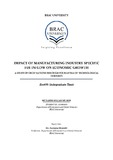| dc.contributor.advisor | Munshi, Farzana | |
| dc.contributor.author | Mubde, Mutasim Billah | |
| dc.date.accessioned | 2018-11-28T06:21:41Z | |
| dc.date.available | 2018-11-28T06:21:41Z | |
| dc.date.copyright | 2018 | |
| dc.date.issued | 2018-09 | |
| dc.identifier.other | ID 15305005 | |
| dc.identifier.uri | http://hdl.handle.net/10361/10888 | |
| dc.description | This thesis is submitted in a partial fulfillment of the requirements for the degree of Bachelor of Social Sciences in Economics, 2018. | en_US |
| dc.description | Cataloged from PDF version of thesis. | |
| dc.description | Includes bibliographical references (page 21- 23). | |
| dc.description.abstract | Investment is hailed as the primary proponent of growth in all economies which makes Foreign Direct Investment inflow a necessary and important part of growth analysis. The FDI decision however depends on the innovation intensity of various industries, among other factors. This particular concept warrants the importance of investigating the industry specific FDI inflow and its relation to growth. Previous literatures has not looked into the impact of the industry-specific FDI inflow, coupled with innovation intensities, on economic growth and thus, the paper looks into whether manufacturing industry specific FDI inflow through four degrees of innovation intensity has a statistically significant impact on economic growth. Using the OECD categorization of manufacturing industries’ technological intensity and taking data on 35 countries over 15 years, from the OECD and WDI database, and using a fixed effects panel estimation with robust standard errors, it is observed that FDI in medium low tech manufacturing industries cause a statistically significant rise in per capita GDP. The finding is interpreted by looking at the resultant market operation structure of the medium low tech industries, which are primarily involved in manufacturing intermediate goods and normal consumer goods. As these industries have a higher product turnover, the impact of this investment can be captured on the short-run or medium-run analysis, whereas the returns on investment in the high-tech industries rarely has any significant impact on the short-run analysis. With regards to these results, policies to attract FDI in medium low-tech industries are inherently beneficial for the recipient nations. Thus, policies enacting FDI liberalization is required to induce higher economic growth. | en_US |
| dc.description.statementofresponsibility | Mutasim Billah Mubde | |
| dc.format.extent | 35 pages | |
| dc.language.iso | en | en_US |
| dc.publisher | BRAC University | en_US |
| dc.rights | BRAC University thesis reports are protected by copyright. They may be viewed from this source for any purpose, but reproduction or distribution in any format is prohibited without written permission. | |
| dc.subject | Manufacturing industry | en_US |
| dc.subject | FDI inflow | en_US |
| dc.subject | Economic growth | en_US |
| dc.subject | Innovation intensity | en_US |
| dc.subject.lcsh | Manufacturing industries -- Bangladesh | |
| dc.subject.lcsh | Economics. | |
| dc.subject.lcsh | Development economics. | |
| dc.title | Impact of manufacturing industry specific FDI inflow on economic growth | en_US |
| dc.type | Thesis | en_US |
| dc.contributor.department | Department of Economics and Social Sciences, BRAC University | |
| dc.description.degree | B. in Economics | |

